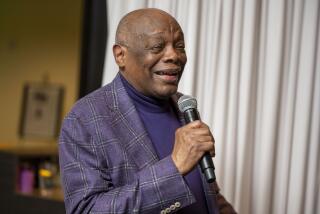Archie Brown; Communist Party Labor Leader
SAN FRANCISCO — Archie Brown, a prominent waterfront labor leader and perennial California office-seeker who won a 1965 Supreme Court decision affirming the right of Communists to hold union office, has died.
Brown was 79 when he died Friday of lung cancer at his home in San Francisco.
As an officer in the International Longshoremen’s and Warehousemen’s Union Local 10, Brown became nationally known as a target of the House Un-American Activities Committee during the early 1960s.
He eventually was prosecuted for his communist beliefs; the case ended in his victory before the Supreme Court.
Brown--who ran as a write-in candidate for governor of California in 1946 and as a candidate for San Francisco supervisor in 1975, among other races--was born in Sioux City, Iowa. As a teen-ager, he rode freight trains to Oakland, where he became a newsboy and began a long career of labor organizing. His first action was a newsboys’ strike in 1928.
At 18, he joined the Young Communist League. His soapbox speeches earned him frequent arrests for disturbing the peace or interfering with police.
After attempts at organizing California agricultural workers, Brown joined the waterfront union movement that emerged in the maritime strike of 1934.
His first notable brush with the law came in 1935, when he and three others were charged with murdering a man in a fight at a San Francisco union hall. The man allegedly jumped out a window and later died.
The four were cleared of the charges, but Brown was forced to work as a longshoreman under an assumed name until 1941, when he gained the right to a regular job.
He was appointed state trade union director for the Communist Party in 1946.
In 1960, Brown appeared as a hostile witness before the House committee during hearings in San Francisco. He was ejected from the hearings and accused by committee supporters of masterminding anti-committee demonstrations.
Brown argued that retaliation for his anti-committee activities came the next year, when he was arrested and charged with violation of a clause of the 1959 Landrum-Griffin Act barring Communists from holding union office.
He was found guilty in 1963, but a federal appeals court held that the ban was unconstitutional. The Supreme Court agreed two years later.
Although Brown retired in 1977, he remained active in supporting left-wing causes.
He traveled to Barcelona in 1988 for the unveiling of a monument marking the 50th anniversary of the International Brigades, which fought against Francisco Franco in the Spanish Civil War. Brown had served as a machine gunner with the Abraham Lincoln Brigade.
He is survived by his wife, Esther, a sister, two brothers, three daughters and a son.
More to Read
Sign up for Essential California
The most important California stories and recommendations in your inbox every morning.
You may occasionally receive promotional content from the Los Angeles Times.










